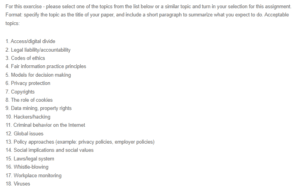The Role of Cookies
Cookies are pieces of information (such as passwords and usernames) from a website stored in a web browser, which a website can retrieve later (Wagner, 2020). Lou Montulli made cookies in 1994. He intended to create a more seamless encounter for persons executing profitmaking transactions online. The name cookie came from a previous programming word, “magic cookie” (Wagner, 2020). This package of data programs ensured data was unchanged even after being received and sent numerous times. There are two types of cookies: magic and HTTP cookies. So what are cookies used for, or rather, what is the role of cookies? Cahn, Alfeld, Barford & Muthukrishnan (2016) affirm that cookies play several vital functions. Most importantly, cookies communicate to the server that specific users are back on a particular website. It is a cookie that gives information when users return to a website, allowing the site to show selected targeted content and settings.
Cookies are also used to store vital information such as login or registration details, shopping cart contents, and user preferences. The cookies do this so that whenever users return or revisit sites, any data or information that was accessible in the last session or any preferences are easily retrievable (Wagner, 2020). Cookies are also used to personalize customized advertisements. Advertisers use it to track user activities across various sites to target ads better. Finally, cookies are used for tracking, mainly by shopping sites (Cahn, Alfeld, Barford, & Muthukrishnan, 2016). This helps companies track items users viewed previously, enabling the sites to propose other goods that match their preferences or preferences and keep selected items within the shopping cart as users continue shopping. There are other roles of cookies; just a few have been explained.
For the term paper on this topic, I will explore and discuss cookies, beginning with background information, their origin, different definitions, and types of cookies and how they work. I will also examine cookies’ privacy issues, risks, and attacks. After that, I will discuss the various roles of cookies in depth while giving appropriate and applicable examples. Then, conclude with a rationale and limitation or critique of cookies.
References
Wagner, P. (2020). Cookies: Privacy risks, attacks, and recommendations. Attacks and Recommendations (December 8, 2020).
Cahn, A., Alfeld, S., Barford, P., & Muthukrishnan, S. (2016, April). An empirical study of web cookies. In Proceedings of the 25th International Conference on World Wide Web (pp. 891-901).
ORDER A PLAGIARISM-FREE PAPER HERE
We’ll write everything from scratch
Question 

The Role of Cookies
For this exercise – please select one of the topics from the list below or a similar topic and turn in your selection for this assignment.
Format: specify the topic as the title of your paper, and include a short paragraph to summarize what you expect to do. Acceptable topics:
1. Access/digital divide
2. Legal liability/accountability
3. Codes of ethics
4. Fair information practice principles
5. Models for decision making
6. Privacy protection
7. Copyrights
8. The role of cookies
9. Data mining, property rights
10. Hackers/hacking
11. Criminal behavior on the Internet
12. Global issues
13. Policy approaches (example: privacy policies, employer policies)
14. Social implications and social values
15. Laws/legal system
16. Whistle-blowing
17. Workplace monitoring
18. Viruses
Some additional topics:
1. Big Dig Collapse
2. Disaster Relief
3. Fabricating Data
4. Green Power
5. Greenhouse Gas Emissions
6. Halting a Dangerous Project
7. Hurricane Katrina
8. Moral Development
9. Oil Spill
10. Reformed Hacker
11. Software for a Library
12. Sustainability
13. Training Firefighters